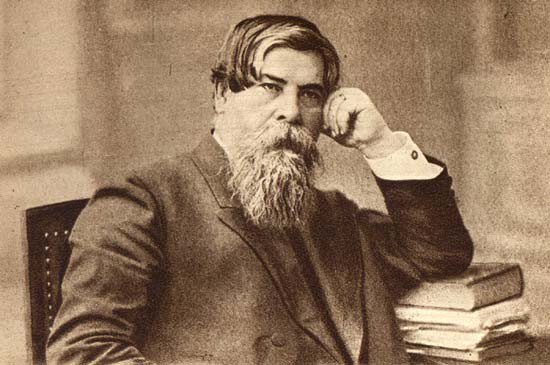He sought the foundations of personality in neurology: Who is Vladimir Behterev?
According to him, the soul could only be a reflection, a by-product of matter. That's why he considered neurology the father of psychology.

(1857-1927) Russian psychologist and neurologist. He explored the objective neurological basis of personality formation. Vladimir Mikhailovich Behterev was born on January 20, 1857, in a village near Viatka (present-day Kirov). He died in Moscow on December 24, 1927.
In 1873 he entered the Petersburg Medical Faculty, then the Military Medical Academy. After 1878, he worked in the department of nervous and mental diseases. He received his doctorate in 1881. He went abroad in 1884 and worked with Wundt and Charcot. When he returned to Russia, he became a professor at Kazan University. Here he conducted clinical research on mental illness and contributed to the establishment of the first psychophysiology laboratory.
In 1893 St. He worked first as a professor and then as an administrator at the Military Medical Academy in St. Petersburg. In 1907 he founded an institute here, which later became the Leningrad State Academy of Psycho-neurology. In 1918, he was appointed director of the newly created Brain Research Institute. He published the first neurology journal in Russia, Nevrologi çeski Vestnik, and founded the Kazan Association of Neuropathologists and Psychiatrists.
Behterev focused his work on the study of the objective neurological basis of personality with its normal and pathological aspects. It aimed to base psychology on objectivity; tended to develop a psychological system based on physiology. Influenced greatly by Charcot and Wundt, he studied neural structures and functions and worked on experimental psychology. Believing that the objectively observed reactions of the organism should be examined for the development of the science of psychology, Behterev shared the materialistic views of thinkers such as Diderot, La Metric, and Helvetius, which accepted man as a part of material nature. As a result, he approached the spirit-matter problem with the concept of "physical energy" and considered matter and spirit as products of the same mechanical energy.
Behterev's work on conditioned reflexes, which he called "correlated reflexes," contributed to the strengthening of the tendency in psychology to describe psychological phenomena in general physiological terms. Behterev, who was greatly influenced by Pavlov's research on the conditioned reflex, placed much more emphasis on objectivity; He introduced the concepts of "objective psychology", "psycho-reflexology" and "reflexology". Behterev's theory of "correlated reflexes", which is gained as a result of the coinciding and "matching" of events in the outside world with the innate reactions of the organism in the individual life of animals and humans, constituted the mainstay of reflexology.
Behterev significantly improved the knowledge of the formation of the central border system and communication routes with his morphology studies. He described a number of neural communication systems and cellular nuclei unknown before him. For example, the identification of the cellular cluster called “Behterev nuclei” located outside the fourth ventricle in the brain belongs to him.
Behterev, with his physiological studies of special importance, revealed the functions of the branches of the nervous system in humans and some animals. He made physiological studies showing that there are centers in the midbrain that direct the functioning of the heart, blood vessels, digestive apparatus, bladder, pupil, and other organs. Based on these data, Behterev proved the existence of higher vegetative and sympathetic centers that regulate the functioning of internal organs in this region of the nervous system. He revealed that higher sympathetic nerve centers are located in the thalamus region, which is a part of the cerebellum at the base of the brain, and drew attention to the importance of thalamus centers in the emergence of emotions. Besides these, he studied the effects of the brain hemispheres on the functioning of various organs and functional systems.
Behterev, for the first time, expressed a series of characteristic reflexes and symptoms that are important for the diagnosis of nervous diseases in the context of his clinical studies in the fields of neuropathology and psychiatry. He suggested that bone reflexes should be examined in the clinic, and he defined disease forms that neuropathology had not previously distinguished. He discovered the spinal hardening disease called "Behterev's disease".
Behterev, in his psychiatry studies, dealt with the disorder of mental processes in connection with the deterioration of bodily functions. He opposed the system of suppressing the mentally ill and widely used methods such as treatment with work, culture physics, and water therapy (hydrotherapy). He developed new methods in the treatment of many diseases, especially in the treatment of alcoholism with hypnosis.
Behterev, who connects the definition of biological and psychological phenomena to physical and chemical processes, pioneered much research on issues such as child development, mental health, suicide, and delinquency until his death. Behterev greatly influenced representatives of the American Behavioral School, especially Watson.
WORKS (mainly):
Provodiaschiye puti spinnogo i golovnoyo mozga, 1896-1898, (“Conduction Paths of the Brain and Spinal Cord”);
Osnovi uçeniya o funkyaki mozga, 1903-1907, (“Basics of the Science of Brain Functions”);
Obyektivnaya psikologiya, 1907-1910, (“Objective Psychology);
Kollektivnaya reflexologiya, 1921, (“Collective Reflexology”).
